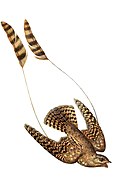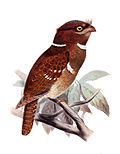Discosura
| Discosura | |
|---|---|

| |
| Green thorntail, Discosura conversii | |
| Scientific classification | |
| Domain: | Eukaryota |
| Kingdom: | Animalia |
| Phylum: | Chordata |
| Class: | Aves |
| Clade: | Strisores |
| Order: | Apodiformes |
| Family: | Trochilidae |
| Tribe: | Lesbiini |
| Genus: | Discosura Bonaparte, 1850 |
| Type species | |
| Trochilus longicaudus (racket-tipped thorntail) Gmelin, JF, 1788
| |
| Species | |
|
5, see text | |
Discosura is a genus of South and Central American hummingbirds in the family Trochilidae. The thorntails are sometimes placed in the genus Popelairia (Reichenbach, 1854), leaving Discosura for the racket-tipped thorntail. On the contrary, some have argued for merging this genus into Lophornis, which they overall resemble, except for the highly modified tail-feathers of the males.
Taxonomy
[edit]The genus Discosura was introduced in 1850 by the French naturalist Charles Lucien Bonaparte.[1] Bonaparte did not specify a type species but this was designated as the racket-tipped thorntail by George Robert Gray in 1855.[2][3] The genus name combines the Ancient Greek diskos meaning "plate" with oura meaning "tail".[4]
The genus contains five species.[5]
| Image | Common Name | Scientific name | Distribution |
|---|---|---|---|
 |
Wire-crested thorntail | Discosura popelairii | Colombia, Ecuador and Peru |
 |
Black-bellied thorntail | Discosura langsdorffi | Bolivia, Brazil, Colombia, Ecuador, Peru, and Venezuela. |
 |
Letitia's thorntail | Discosura letitiae | Probably Bolivia (only known from two old specimens of uncertain origin) |
 |
Green thorntail | Discosura conversii | Costa Rica to Ecuador |
 |
Racket-tipped thorntail | Discosura longicaudus | Brazil, French Guiana, Guyana, Suriname, and southern Venezuela |
References
[edit]- ^ Bonaparte, Charles Lucien (1850). Conspectus Generum Avium (in Latin). Vol. 1. Leiden: E.J. Brill. p. 84.
- ^ Gray, George Robert (1855). Catalogue of the Genera and Subgenera of Birds Contained in the British Museum. London: British Museum. p. 22.
- ^ Peters, James Lee, ed. (1945). Check-List of Birds of the World. Vol. 5. Cambridge, Massachusetts: Harvard University Press. p. 35.
- ^ Jobling, James A. (2010). The Helm Dictionary of Scientific Bird Names. London: Christopher Helm. p. 137. ISBN 978-1-4081-2501-4.
- ^ Gill, Frank; Donsker, David; Rasmussen, Pamela, eds. (August 2024). "Hummingbirds". IOC World Bird List Version 14.2. International Ornithologists' Union. Retrieved 30 August 2024.







